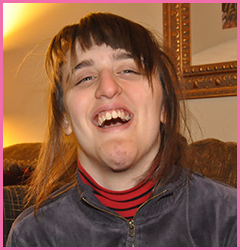
Photo by Brian Doyle
I saw stars.
We had just finished the 30-day review meeting of Madison’s adult placement. I had scheduled it early enough on Tuesday so I could still take Madison out for our customary lunch together. I had wheeled into the lobby where I was to meet Madison, but had stopped to take a phone call from the pharmacist about a medication for her.
Madison met me as I was finishing the call. I’d just hung up when I felt a stunning blow to the top of my head. I slumped over, seeing stars, and then looked up from my wheelchair to see Madison laughing. It took me a minute to put it together.
She’d hit me. Hard. Whacked me full force across the top of my head. And was laughing hysterically.
It’d been years since she’d hit me like that, but my response came thundering back. “Madison Rae,” I said to her in a low calm voice, grabbing both hands. “Look at my eyes. There is no hitting.”
She looked at me, smiling, eyes still twinkling.
“Madison, look at me. There is no hitting.”
Her smile faded.
“Madison hurt Mommy. Say, ‘Sorry, Mom.'”
“Sorry, Mom,” she mumbled, the twinkle gone.
“There is no hitting.”
I’m not sure what provoked her; maybe she had waited too long. Maybe she didn’t like my phone call. Maybe it was another adjustment issue like the ones we’d just finished discussing in the meeting.
But now I had a decision to make. Should I take her to lunch, in spite of her behavior? Would she think it rewarding? Or would it set off an even bigger upset?
“Will anyone be able to go with us?” I asked the Day Hab staff.
The answer was no. I knew it might be. I’d been told many times that Adult Services did not include as many resources as the education’s Pre-21 program.
“No lunch today, Madison,” I said. “Kiss Mommy goodbye.”
And she did.
“And remember,” I prompted her.
“I love you,” she replied.
“Always and,”
“Forever,” she said as they took her back to her room. I hoped our goodbye routine would ease her back into her schedule.
“I don’t want to reward that behavior,” I told her aide. “I will FaceTime her tomorrow.”
I wheeled out of the building, my vision blurring as the tears finally spilled. My head hurt. My heart hurt. Madison wasn’t the only one who had to adjust.
In FaceTime the next day she was happy.
“Was she upset after I left?” I asked.
“Not at all.”
“Whew, I’d worried about that.”
And after singing, Raffi’s “Do Your Ears Hang Low,” and Mary Kate and Ashley’s, “Brother for Sale,” Madison pushed the end call button and we hung up.
I stared at my blank iPad and wondered how long it will take her to get comfortable with the new program. Was it an isolated incident? For our future lunches, did I want to chance that kind of behavior in a public place with no staff to help me?
What was safe for Madison? What was safe for me?
Then it dawned on me—I could bring lunch to her. I could pick up lunch and we could still share a meal. That would be our transition plan.
Until we both adjusted.
This column was originally published as part of my “Tuesdays with Madison” series at AutismAfter16.com.
Follow Me!